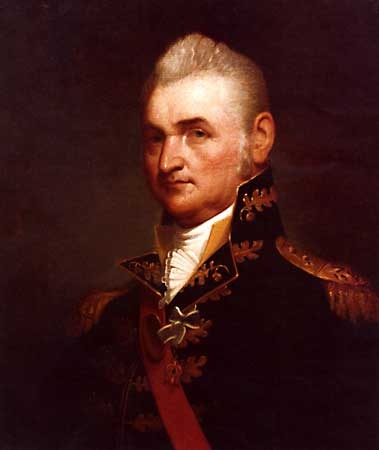Dearborn, Henry
United States general and politician
born Feb. 23, 1751, Hampton, N.H. 【U.S.】
died June 6, 1829, Roxbury, Mass., U.S.
 U.S. army officer, congressman, and secretary of war for whom Ft. Dearborn (Dearborn, Fort)—whose site is located in what is now the heart of Chicago—was named.
U.S. army officer, congressman, and secretary of war for whom Ft. Dearborn (Dearborn, Fort)—whose site is located in what is now the heart of Chicago—was named.He abandoned the practice of medicine to fight in the American Revolution, fought at the Battle of Bunker Hill (Bunker Hill, Battle of), and was captured during the failed expedition against Quebec. Subsequently exchanged, Dearborn served in the Saratoga (Saratoga, Battles of) campaign (1777), at Valley Forge (1778), and in the Battle of Monmouth (Monmouth, Battle of). He played a prominent role in the 1779 expedition against the Iroquois Confederacy.
Dearborn's success in raising men, supplies, and money for the New Hampshire Continentals led in 1781 to an appointment as deputy quartermaster general. He served on George Washington (Washington, George)'s staff at Yorktown, and he returned to civilian life in 1783 after eight years of service that established him as one of the best citizen officers developed by the revolution.
On the organization of the U.S. government, Dearborn was appointed marshal for the District of Maine (1789–93). He represented Massachusetts in Congress (1793–97) and was secretary of war under Pres. Thomas Jefferson (Jefferson, Thomas) (1801–09). As secretary of war he issued an order in 1803 “for erecting barracks and a strong stockade” at “Chikago with a view to the establishment of a Post.” When the War of 1812 began, Dearborn, then senior major general of the U.S. Army, attempted to invade Canada at several points. After a long succession of delays and reverses, he was removed from command by Pres. James Madison (Madison, James) on July 6, 1813. Dearborn ended his public career as U.S. minister to Portugal (1822–24).
- cinematography
- Cinerama
- cineraria
- cinnabar
- Cinna, Gaius Helvius
- Cinna, Lucius Cornelius
- cinnamon
- Cinnamus, John
- Cino Da Pistoia
- Cinq-Mars, Henri Coiffier de Ruzé, marquis de
- cinquain
- cinquefoil
- Cinque Ports
- Cintio Vitier
- Cintrón, Conchita
- ciné-club
- Cinématographe
- cinéma vérité
- Ciompi, Revolt of the
- cipher
- Cipriani, Giovanni Battista
- Cipriano Castro
- circadian rhythm
- Circassian
- Circe